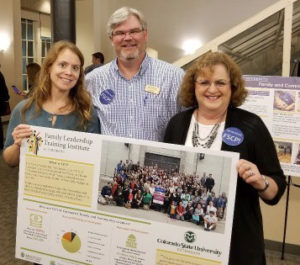Each fall the Colorado Department of Education selects schools, school districts, and community partners who are doing outstanding work across the state.
Recently the Family Leadership Training Institute (FLTI) was selected as a ‘promising practice’ for school districts to explore. Creating strong and positive school, family, and community partnerships by civically engaging community members is the core of FLTI work in communities around Colorado.

FLTI of Colorado Assistant Coordinator, Patti Schmitt, with DJ Anderson, family leader from Larimer County, and Colorado Senator Evie Hudak present the poster for FLTI of Colorado’s Promising Partnership Practice at the kick-off event hosted by the Colorado Department of Education.
“This is a great way to explore new ways to partner with schools and districts in local communities,” said Patti Schmitt, FLTI of Colorado Assistant Coordinator. “We’re able to make new connections with people and programs committed to family engagement.”
For the sixth consecutive year, Gov. John Hickenlooper has proclaimed the month of October Family and School Partnership in Education Month. FLTI of Colorado is featured in the 2017 Promising Partnership Practices Report.
FLTI of Colorado is a program created with families for families. The curriculum equips parents with the knowledge and skills to support their engagement with the school district, schools, and community systems at the individual, community, school, and policy level.
The free 20 week training integrates personal and child development, leadership skill development, civic literacy, and civic engagement. The curriculum features five components:
-A community building retreat;
-Ten sessions that focus on personal leadership development;
-Ten sessions that focus on the civic process and change;
-A Day at the Colorado State Capitol for on-site learning, and
-A personally developed civic project.
Since inception in Colorado, FLTI has been successful in recruiting diverse participants across race, age, educational backgrounds, and income levels. Education backgrounds vary: 6% received an education of less than high school; 35% were high school or GED graduates; 3% had completed two-year associate
college programs; 21% were graduates of four-year college programs; 22% had a master’s, doctoral or professional degree; 14% achieved post-graduate work;
and 4% were still in high school.
FLTI leaders across Colorado have consistently created positive change in communities for children, youth, and families.
